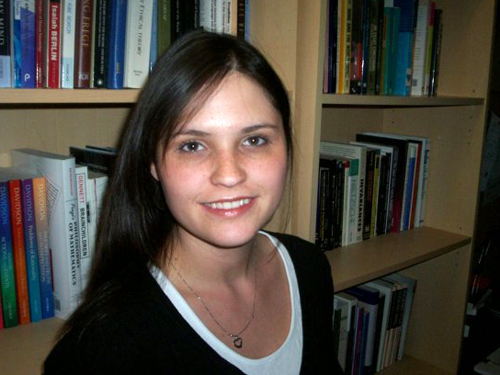
By combining two schools of thought on eating disorders, Amy Butchart is trying to shed light on a poorly understood disorder with both mental and physical symptoms.
There are two ways of looking at eating disorders, says the PhD student in philosophy. One perspective is based on medical and scientific evidence; the other views eating disorders as the by-product of socio-cultural pressures. “These are arguments that suggest that social influences are responsible for, or contribute to, women or men developing eating disorders.”
Butchart is looking at both medical and socio-cultural perspectives, including the physiological and neurological changes that accompany an eating disorder, and the views of feminist cultural theorists and philosophers. “Feminist philosophers of science and feminist cultural theorists have at times looked at the social profile of the disease and failed to look at the medical profile of the disease,” she says. “I think it’s important to look at both of these things and synthesize them to try to build bridges between these two different camps.”
Butchart hopes that both sides will gain a better understanding of eating disorders by looking at the disease from every angle. Medical professionals should consider the socio-cultural factors that contribute to eating disorders, she says, and philosophers should examine the neurobiological evidence to help develop their theories.
The pressure for women to conform to the ideal feminine form as depicted in the media can trigger eating disorders. “The idea that one needs to be a certain size or look a certain way to embody what we think it means to be feminine or female” creates a standard that few women can live up to, says Butchart. Since eating disorders tend to affect mostly women, men who have the disease often suffer in silence due to a lack of understanding and support from the medical community.
The complexity of eating disorders makes it difficult to pinpoint the cause, which is likely a combination of mental, physical and social triggers. “It’s pretty much impossible to suss out what’s the primary contributor,” says Butchart. “I think we might say that, culturally, women and men experience a different reality. I think these disorders are defined by the fact that they involve physiological and socio-cultural phenomena.”
Butchart is also looking at research on functional MRIs and PET scans of people who have eating disorders and those who have recovered, which suggests that brain composition may affect a person’s susceptibility to developing an eating disorder. Brain scans of people with anorexia show that their brains shrink as the disease progresses, she says, but changes in brain size and structure may also be a response to socio-cultural influences.
Butchart hopes that collaborative research between medicine and philosophy will lead to better treatments for eating disorders. “I’m trying to do a philosophical analysis of both camps of this literature,” she says. “Philosophers looking at philosophical or cultural literature need to also adopt some of the vocabularies that are employed in scientific studies so that these two different camps can communicate. I think if we’re able to do that, we can come to a more robust understanding of eating disorders and potentially other complex disorders like mania and depression.”
Her master’s degree at the University of Windsor focused on feminist philosophy of science, specifically how the male body was considered the “norm” in medical research and defined the management and treatment of disease. Heart attacks, for example, were more thoroughly studied in men, and doctors believed that both men and women experienced the same symptoms. Research on eating disorders is also gender-based, focusing more on women even though both sexes experience eating disorders differently.
“I’ve always been interested in health research and ultimately working on research that might eventually help better the lives of Canadians,” says Butchart.